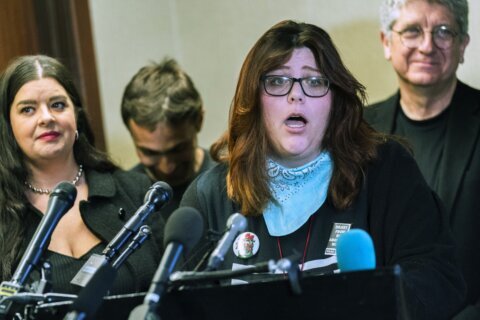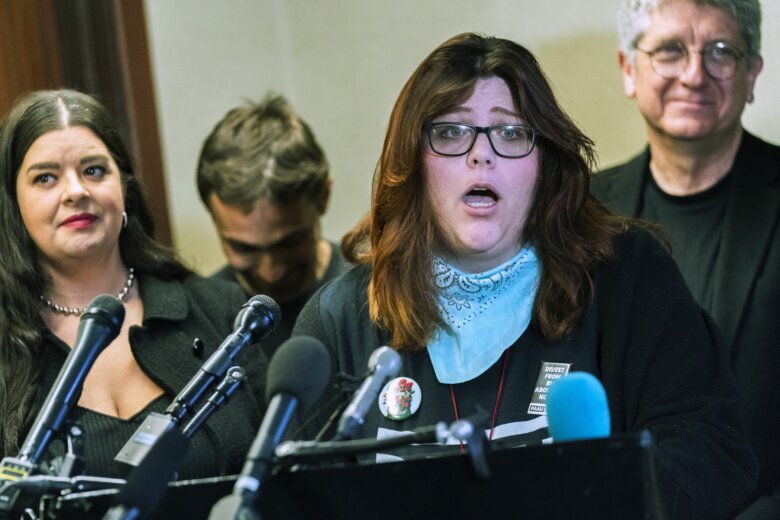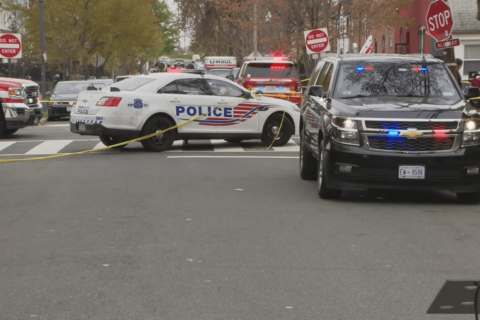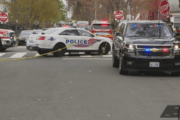
WASHINGTON (AP) — An anti-abortion activist who led others on an invasion and blockade of a reproductive health clinic in the nation’s capital was sentenced on Tuesday to nearly five years in prison.
Lauren Handy, 30, was among several people convicted of federal civil rights offenses for blockading access to the Washington Surgi-Clinic on Oct. 22, 2020. Police found five fetuses at Handy’s home in Washington after she was indicted.
A clinic nurse sprained her ankle when one of Handy’s co-defendants forced his way into the clinic and pushed her. Another co-defendant accosted a woman who was having labor pains, preventing her from getting off a floor and entering the clinic, prosecutors said.
Inside the clinic’s waiting room, Handy directed blockaders to link themselves together with locks and chains and block the doors. A co-defendant used social media to livestream the blockade, which lasted several hours before police arrested the participants.
Handy declined to address the court before U.S. District Judge Colleen Kollar-Kotelly sentenced her to four years and nine months in prison.
Handy’s supporters applauded as she was led out of the courtroom. “You’re a hero, Lauren!” one of them shouted.
The judge told Handy that she was being punished for her actions, not her beliefs.
“The law does not protect violent nor obstructive conduct, nor should it,” Kollar-Kotelly said.
Prosecutors recommended a prison sentence of roughly six years for Handy. They described her as an anti-abortion extremist who was a “criminal mastermind” behind the Washington invasion and similar attacks on other clinics.
“Her strongly held anti-abortion beliefs led her to devise a plan to block access to the Surgi-clinic,” prosecutors wrote. “The blockade, which was broadcast to Handy’s legion of followers, encouraged others to commit similar crimes, publicized her own offense, and traumatized the victims.”
A jury convicted Handy of two charges: conspiracy against rights and violating the Freedom of Access to Clinic Entrances Act, more commonly known as the FACE Act.
Defense lawyers asked for a prison sentence of one year for Handy, who has been jailed since her August 2023 conviction. Her attorneys described her as a compassionate activist who “cares deeply for the vulnerable communities she serves.”
“Her goal in life is to protect those who cannot protect themselves, and to empower those who do not feel that they have any power,” the defense attorneys wrote.
Handy’s nine co-defendants were Jonathan Darnel, of Virginia; Jay Smith, John Hinshaw and William Goodman, all of New York; Joan Bell, of New Jersey; Paulette Harlow and Jean Marshall, both of Massachusetts; Heather Idoni, of Michigan; and Herb Geraghty, of Pennsylvania.
Goodman and Hinshaw were sentenced on Tuesday to prison terms of 27 months and 21 months, respectively, according to prosecutors.
Smith was sentenced last year to 10 months behind bars. Darnel, Geraghty, Marshall and Bell are scheduled to be sentenced on Wednesday. Idoni is scheduled to be sentenced next Tuesday. Harlow’s sentencing is set for May 31.
“These are good people who wouldn’t hurt anybody on purpose,” said Martin Cannon, one of Handy’s attorneys. “Lauren has done enough time. Send Lauren home. Send them all home.”
Darnel joined Handy in planning and leading the Washington clinic invasion, using social media to recruit participants and discuss their plans, prosecutors said.
Handy used a false name to book a fake appointment at the clinic on the morning of the invasion. When a clinic employee unlocked a door to admit patients, the defendants pushed and shoved their way in while Darnel livestreamed the blockade.
“As the codefendants executed the blockade, Handy used a rope stretched across the entrance threshold to obstruct entry into the clinic’s waiting room,” prosecutors wrote. “After the blockade was successfully executed, Handy briefly left the building to act as the group’s police liaison.”
The judge said Handy and her fellow activists didn’t show any compassion or empathy to the patients who were prevented from getting care that day.
“No caring or sympathetic gestures at all,” Kollar-Kotelly said.
Handy and some of her co-defendants also blockaded reproductive health clinics in Silver Spring, Maryland, and Alexandria, Virginia, after the Washington invasion, prosecutors said.
Handy’s attorneys said she founded and operated a nonprofit organization, Mercy Missions, that “helps families and mothers in crisis pregnancies.” She also joined a group called Progressive Anti-Abortion Uprising before her March 2022 arrest.
Copyright © 2025 The Associated Press. All rights reserved. This material may not be published, broadcast, written or redistributed.








